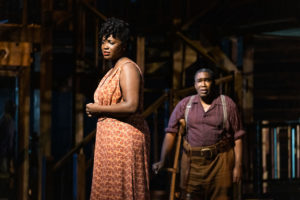
Metropolitan Opera 2021-22 Review: Porgy and Bess
Angel Blue, Eric Owens Lead Complex & Exciting Revival
By Logan Martell(Credit: Evan Zimmerman)
On October 31, 2021, the Metropolitan Opera opened this season’s run of the Gershwins’ “Porgy and Bess.” This revival of James Robinson’s acclaimed, 2019 production saw nearly the entire cast return to Catfish Row for a truly powerful opening night, led by conductor David Robertson.
The set featured a rotating, framework of the boarding house which struck an interesting balance between being a more conceptual staging and portraying the poor living conditions, while allowing the audience a better look into both interior and exterior events. With so much of the story taking place during communal events, there was often a full stage of ensemble performers and dancers, making the scarcer approach to the set feel like there was not much lacking.
Complex Portrayals
In the role of Bess, Angel Blue captivated as she fleshed out the character’s arc and eventual downfall with great vocal prowess and dramatic nuance. When making her entrance, we’re introduced to a much rowdier version of herself, capping off her line “Have one to the God-fearing ladies. There’s nothing like them, thank God,” with soaring, defiant tones. This was also seen in how Blue used her taller frame to stare down Maria before bumping her away with her hip. After starting life with Porgy, she was able to join in restoring spirits following the arrangements for Robbins’ funeral, and displayed a bashful yet joyous approach to her duet “Bess, You is My Woman Now.” After exchanging lyrical measures in the first section, the second saw Blue and Owens finely balance their differing tempos to reunite for a tender conclusion.
Her encounter with Crown on Kittiwah Island, now used to close the first half of the performance, unfolded in a direction not often taken. After grappling physically and emotionally with him, this Bess is able to throw him off and start to run, only to succumb to her own desires and choose to return to Crown. This choice, while seeming to grant her more agency, also makes one question how much of it was truly her own decision, given the sheer influence of the men around her. Furthermore, her resulting fever and delirious state after the act seems more like the product of guilt rather than being caused by sexual assault.
Through her dealings with Crown, Sportin’ Life, Porgy, and the rest of Catfish Row Blue’s Bess finds herself going through a practically complete cycle of redeeming her original poor reputation, becoming a mostly-faithful wife figure to Porgy and foster mother for Clara’s baby, and then falling back into addiction and lust. Through all this complexity, Blue handled the role splendidly and often earned great applause.
As Porgy, Eric Owens brought out much of the character’s vulnerabilities and strengths to wonderful effect. His affable entrance to the dice game soon took an introspective turn as the lights cooled and all other characters froze, leaving Owens to share more of the beggar’s lonesomeness as the orchestra introduces the motifs that would play a fuller part in his later love duet with Bess. This effect was contrasted not long after by the warmth and vitality that Owens employed for “I Got Plenty O’ Nuttin’,” given while surrounded by children and more enmeshed within his community. This frozen moment ultimately came back again towards the finale as Porgy tries to understand Bess’ disappearance, but this time he was joined by Maria and Serena, whose lyrical concerns were able to permeate this created space, but went unheeded by Porgy as he resolved to travel to New York.
Owens’ directions managed to get the most out of his character’s limited movement, one prominent example of this came when Porgy, only able to make it halfway up the stairs to pay respects to Serena at Robbins’ wake, remained at the middle platform between flights while the women mourned and later descended; what was the lower ground during the wake became the high ground during the burial arrangements, from where Owens delivered rich, assuring phrases like one giving a sermon from a pulpit. This was used to greatest effect for his fight scene with Crown where, having been thrown on the stairs, Porgy is able to wrestle Crown into a position to kill him. As Owens laid panting in victory, he broke the charged silence with a triumphant cry of “Bess! You got a man! You got Porgy!” This moment of both strength and weakness was given all the more impact as he froze into place while the lights dropped a sudden wash of yellow like the glow of early morning. For the final number “Oh Lawd I’m on My Way,” Owens utilized a higher, anguished quality which helped distinguish his lower voice from the dense texture of the ensemble during this truly powerful finale.
Bringing Danger to Life
In the role of Crown, Alfred Walker achieved much in bringing the character’s danger to life. While not the largest figure on the stage, Crown’s menacing nature was established early on between Walker’s swaggering gait and almost-snarling demeanor as he got progressively more violent during the dice game. When reappearing at Kittiwah Island, Walker’s phrases, while aggressive throughout, initially bore traces of a more touching sentiment as he attempted to relate his own loneliness, shortly before his attempts to take Bess by force. These vocal qualities helped support the sense that, despite his seeming loathsomeness, there were aspects to Crown that Bess found attractive enough to justify returning to him after literally escaping his clutches, making their confrontation feel like an inversion of Bess’s earlier duet with Porgy.
The storm scene saw Walker return again, his confidence and vocal strength came as the only opposition to the rest of the gathered people, challenging their beliefs as he related his battle with God through the storm. These lines allowed Walker to indulge in longer, exultant tones, while his song about red-haired women made use of a quicker rhythm as he tried to raise spirits in his own way. For a character with hardly any redeeming qualities and an almost one-dimensional, heel-like nature, Walker’s portrayal was compelling and effective throughout.
As Sportin’ Life, Frederick Ballentine was deviously charming and highly flexible in voice and body. Often on the edges of the crowd, his rendition of “It Ain’t Necessarily So” saw Ballentine take center stage and soon make the ensemble dance to his tune, cueing them in while delivering his own lines from a variety of postures and stances while retaining his own support. After getting them in the palm of his hand, he let them do the heavy lifting for the finale of this number as he led them on, and even paused between beats to comment, before bringing it to an entertaining finish as Serena burst in furiously.
His later number, “There’s a Boat Dat’s Leavin’ Soon for New York,” had Ballentine put all his cards on the table as he laid out his vision of temptation for Bess, all the while keeping a shifting physical dynamic with her. His beguiling tones carried oil-slick, as he built towards a soaring B-flat conclusion.
With Bess seeming to lapse back into her use of “happy dust” of her own will, this Sportin’ Life comes across as a dangerous enabler and opportunist rather than a more direct manipulator of events. Cut from this production was his lie to Porgy which makes the latter so hesitant to identify Crown’s body to police, and thus leading to his arrest and removal from Bess’ life. In the end, Bess is alone, an outcome which Sportin’ Life predicted, did little to make happen, and gained immensely from.

Scene Stealers
Sunday’s cast had no shortage of thrilling artists. Latonia Moore’s Serena poignant rendition of “My Man is Gone Now,” nearly brought the show to a stop, as her tragic yet sonorous outpouring drew an extra round of applause before the number’s actual conclusion. Moore finely contrasted this later when leading the prayers of Bess’ recovery in the second half, using firmer, reverent tones closed out by an ornamented, almost jazz-like “Amen.”
As Maria, Denyce Graves made a tough but compassionate matron for the community of Catfish Row. Her encounter with Sportin’ Life, “Friends with you?” saw her unafraid to throw down, making her point clear by fileting a shark before turning her knife and sights on the drug dealer. Her genuine concern for Porgy saw her as the only one not to join in the finale, turning her back and crying as he rushed off against all her warning.
In the role of Jake, Ryan Speedo Green brought levity to the work’s earlier scenes as the burly fisherman serenaded his child with “A Woman is a Sometimes Thing.” His warm and resonant voice did well in his later number “It Takes A Long Pull To Get There” leading the masculine vocal texture.
The full ensemble of this staging ensured a feeling that something was always going on within the community. From the opening number Summertime,” we see Janai Brugger’s Clara serenade her baby as tenants downstairs ready the banners and décor for the later picnic on Kittiwah Island. This sense was established early on musically as her gossamer conclusion diminished until it seemed to melt into the sighing of the chorus and the fluid transition into the clamor of the dice game.
Frequently there were a handful of dancers, whose movements echoed the general mood of the room. While they lent much to the keeping the energy at times through interesting choreography, one instance where they felt out of place was among the grievers at Robbins’ wake, though their languid motions were strongly contrasted by the exuberance that followed as the burial concerns are resolved and the ensemble sang and danced their way to close the scene.
In all, there was much to enjoy about Sunday’s performance of this Gershwin classic. Despite the more barebones set, and condensing of the drama into two acts, the energy of the music and performers filled the stage and the rest of the auditorium. The star-studded roster of artists consistently seized their moments and delivered a truly powerful night of musical drama.



